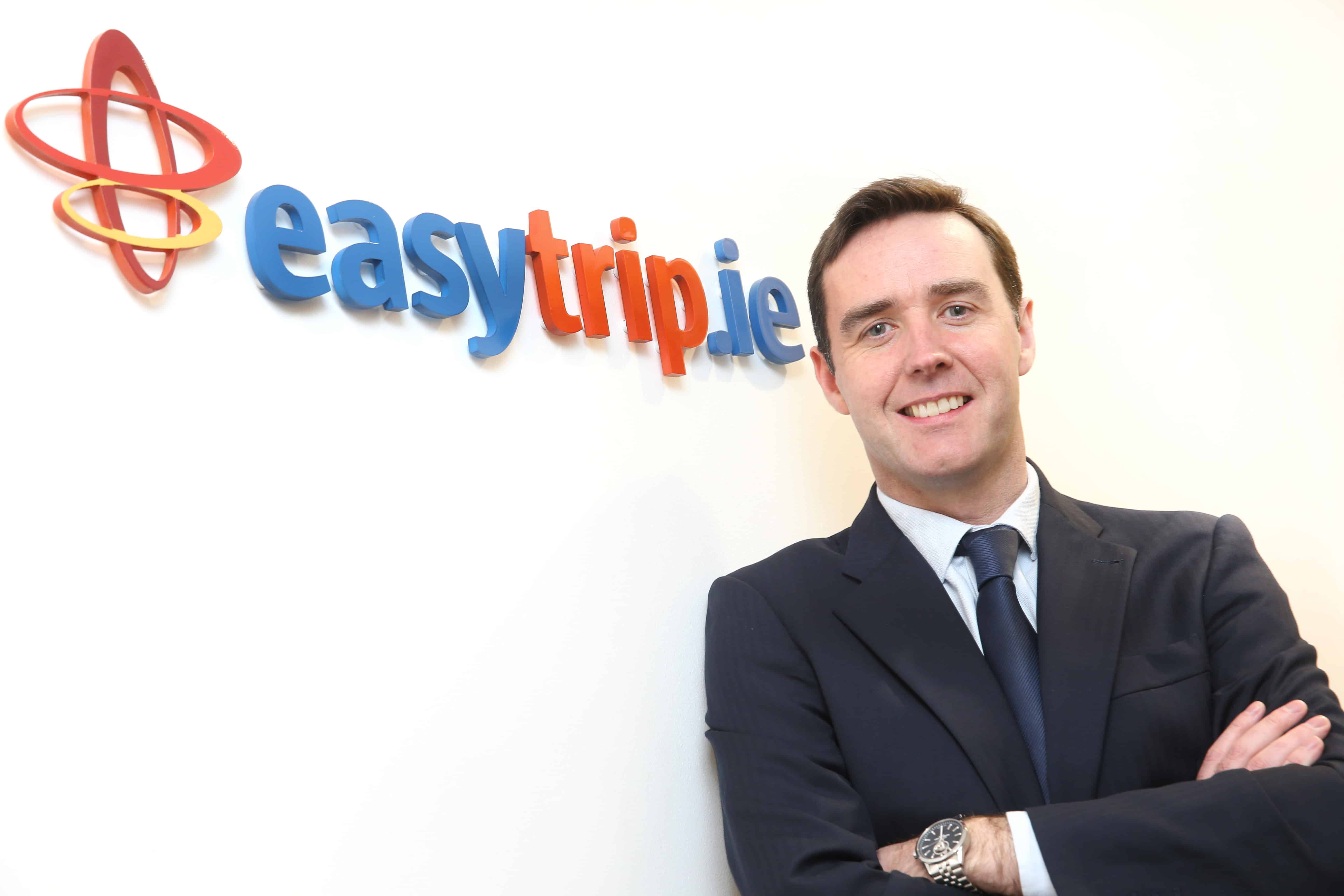Colin Delaney, easytrip
Colin Delaney, easytrip, highlights the importance of making motoring more convenient and pushing STEM.
Q. What are your main priorities and goals in your role?
easytrip is focused on contributing to the advancement of connected services in the transport industry and in leveraging technology and changing customer habits. My priorities are focused on delivering a portfolio of services designed to make journeys easier and it’s important that I develop a winning team and ensure they have the tools to deliver exceptional service to customers every day.
Q. What are your biggest challenges as CEO?
My biggest challenges are my biggest opportunities. Digital transformation of the automotive industry is under way, with vehicle manufacturers and digital giants alike investing heavily in transport services. easytrip must identify and develop the right capabilities to deliver technologies underpinning new services that our customers demand in the emerging industry context. Recruiting experienced, skilled people has become more challenging as the Irish market nears full employment, particularly in our segment.
Q. How do you keep your team/staff motivated?
Communication is key and it’s important to articulate a clear sense of purpose to ensure that each member of my team understands how their role supports the company. Our team is our most important asset and our people need to feel good about doing a good job and getting feedback from mentors is very important. easytrip is a meritocracy and our reward structure ensures every team member is eligible for performance-based benefits. Resources and training are provided. I also recognise that a strong work-play balance is essential to sustain high-performing teams so we organise fun, team-building events and well-being initiatives throughout the year.
Q. What are the challenges facing your industry going forward?
Advances in technology continue to impact every motor industry segment easytrip operates in. Operators providing essential support infrastructure to the automotive industry, e.g. car parks, toll roads, petrol stations, must assess their position in the value chain as electric vehicles, driverless vehicles and connected services evolve. In addition, new entrants are bringing new service models while governments are increasingly shifting citizens from private vehicle ownership to public transport. My industry challenge is how best to leverage it to support existing business and not to lose the human connection.
Congestion in urban areas is a growing problem as employment returns to boom levels and our population increases. Ireland’s supporting transport infrastructure is inadequate and the government needs to provide our state bodies who are responsible for delivering an efficient, sustainable, multi-model transport service with the funds required to achieve this now. They have solutions, and each week without money to invest in transport equates to another minute added to journey times.
Data is important and transport generates significant volumes. Robust structures are required to securely manage data and increased regulation is changing the cost of business for industry players. Cybersecurity along with GDPR and PSD2 compliance are pressing industry challenges in an increasingly cashless society.
Q. What new trends are emerging in your industry?
Aside from the technology advances I described earlier, new consumer trends are emerging. easytrip sells convenience – giving time back to customers. We make it possible for over 220,000 Irish motorists to use express lanes at toll plazas, park without taking tickets and avoid queues at pay stations. Motorists want a ‘one stop shop’ for a range of mobility services with multiple channels to access the services and we are continuously developing complementary, convenient service offerings. We recently launched an easytrip mobile app to satisfy consumer demand and advance their brand experience. I’m excited about this channel and the new services that can be produced to advance and support it.
Q. Are there any major changes you would like to see in your sector?
Congestion is a major problem in terms of time, cost and well-being for businesses and employees. The delivery of major infrastructure projects required to alleviate congestion will take years after funding has been allocated. Ireland cannot wait. Therefore, smaller changes using existing infrastructure must be made now. There are plans to introduce variable speed limits on congested arteries such as the M50 to improve throughput during peak periods yet this alone will not be enough. Variable, multipoint tolling, while politically sensitive, should be introduced with alternative transport modes and routes upgraded to support the resulting modal shift.
The National Transport Authority’s public transport strategy, executed through local authority initiatives, is to be welcomed, though it’s non-public vehicles that contribute significantly to the advancement of commerce in cities today. Where road space is being allocated to public transport, stringent analysis is required to determine if the changes proposed are in the best interests of citizens and commerce.
Q. As an employer are you finding any skills gaps in the market?
Yes, particularly in IT. The Irish tech sector is booming yet we have
only a small pool of qualified people to service SME and larger multinational demand. It is difficult to source IT people with the right skills and experience locally. While expertise can be bought in from abroad, Ireland’s underlying problem is that our education system does not currently produce enough suitably-qualified graduates. Our government’s stated aim is for Ireland to be a European leader in STEM education by 2026. STEM is vital to Ireland’s future prosperity and sustainable employment. Education gaps need to be addressed now to ensure Ireland has a suitable workforce to lead tomorrow’s new businesses and industries.
Q. How did your strategy develop in the context of the banking crisis and economic crisis?
Transport, particularly motoring, was significantly impacted by the downturn. This provided easytrip with an opportunity to re-evaluate our business, restructure and realign costs. We used this period to refocus our business on customer service, implementing initiatives to deliver outstanding value and make easytrip the number one choice for motorists seeking convenience.
We increased our product portfolio to deliver products the market required during that period. For instance, the crisis resulted in motorists keeping their vehicles longer and insurance companies reduced policy features so easytrip developed low-cost vehicle assistance services – Puncture Protect and easyAssist – for motorists. Protecting our customers during the downturn was important to easytrip and they regularly communicate their appreciation and we’re very grateful to have loyal, valued customers.
Q. How will Brexit affect you, or have you started to feel the effects already?
The majority of our business is based in Ireland and domestically, vehicular traffic forecasts are strong. This is positive for easytrip. Increasing traffic from the Republic into Northern Ireland, precipitated by sterling’s weakness, is presenting new opportunities and I’m bullish about further expanding our services in the North. Currently, our easyAssist service delivers all-island breakdown coverage and our ticketless parking is available in Belfast’s Victoria Square car park.
Q. How do you define success and what drives you to succeed?
Success is the accomplishment of what we thought was possible. I’m perpetually driven to improve performance. This is at my core, shaping my thoughts and actions. I’m happiest helping businesses and growing a team. For me satisfaction comes from a sense of fulfilment – that our team has used our time well to deliver what we set out to do.
Q. What’s the best advice you’ve been given, or would give, in business?
The best advice I received and offer today is “When you become a leader, success is all about growing others”. I encourage people to use every encounter as an opportunity to evaluate and build self-confidence in their teams. To also inspire learning and expand boundaries so each person performs to the best of their ability and every member of the team is contributing to the success of the company they work for.
Q. What have been your highlights in business over the past year?
There has been many highlights. The improving economy has significantly increased demand for our traditional road services, particularly our cashless parking. We launched a fantastic, new breakdown recovery and assistance service called easyAssist which is performing well. We’re very proud we could deliver easyAssist with all-island coverage at a price point that is fifty percent less than existing breakdown recovery alternatives in Ireland.
Q. What’s next for the company?
We will continue to expand our product range with new and exciting services while leveraging the mobile channel experience. We will focus on improving our existing services, increasing coverage and targeting new segments. Our parking service, easyParking, currently allows motorists to access over 30 car parks throughout Ireland. This service works by the easytrip tag in vehicles being scanned on entry and exit to the car park with no need to take a ticket. The fee is then automatically deducted from the customer’s account. The benefits to car park operators and motorists alike are great. I believe this service should be used nationally and we will continue our efforts to expand. This year also marks 10 years since easytrip acquired Eazy Pass. We subsequently re-branded both ‘eTrip’ and ‘Eazy Pass’ as easytrip so we will be looking for ways to celebrate this important milestone with exciting brand initiatives this year.
Q. What opportunities or plans for growth do you see in 2018?
I see growth across all our products in all sectors this year, fuelled by the current economic climate. Traditionally growth was aligned to the easytrip tag that motorists fixed to their windscreen. Today we are looking beyond the tag at our customer’s needs. Technology is an enabler and we intend to continue our significant investment in this space at home and abroad.
Q. Where do you want your business/brand to be this time next year?
We want to change the way motorists access services in Ireland and for easytrip to be synonymous with ‘convenience’ in transport. We are working to expand our portfolio with new complimentary services and our brand drive this year will continue along this path with new motoring products launching soon.
Success is the accomplishment of what we thought was possible. I’m perpetually driven to improve performance. This is at my core, shaping my thoughts and actions. I’m happiest helping businesses and growing a team. For me satisfaction comes from a sense of fulfilment – that our team has used our time well to deliver what we set out to do.
easytrip provides electronic tags for vehicle windscreens that allow motorists to avail of hassle-free and cashless parking in select car parks and access to express lanes at toll plazas including savings on the M50 toll charge. Non-tag services include Puncture Protect through a partnership with Advance Pitstop and the newly launched breakdown assistance service easyAssist. For international fleet customers, easytrip also offers European tolls and VAT reclamation services. easytrip currently has over 220,000 customers using its range of innovative services.







